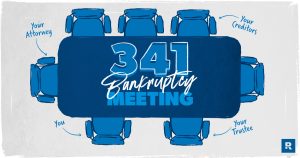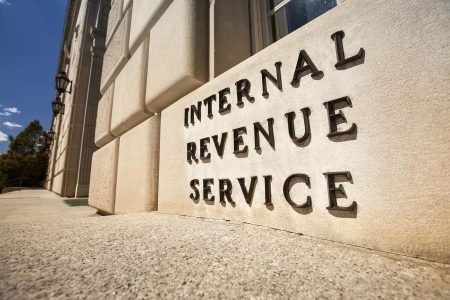This is a published version of our weekly Forbes Tax Breaks newsletter. You can sign-up to get Tax Breaks in your inbox here.
By the time you open this newsletter, my daughter will be a freshly minted college graduate. I can say this with great confidence because (1) her graduation ceremony is early Saturday morning, and (2) she was blessed with a last name that is mentioned early in the ceremony (unlike those of us tucked at the end of the program following the Johnsons and Moores, but fortunately before the Smiths).It’s a weird milestone as a parent. On the one hand, you’re thrilled for your child. On the other hand, change can be scary and unpredictable. And those of us in certain professions (cough, tax) are not fans of things that can be unpredictable—we like consistency, plans, and spreadsheets that plot out what comes next. That’s why we like published guidance, understandable rules—and data.
And while Kate and her friends will be—along with graduates all over the country—thinking about new beginnings, others may be thinking about new beginnings on the other side of the spectrum: retirement. This year, an estimated 4.1 million Baby Boomers in the U.S. will turn 65, the traditional retirement age, and may be thinking about a long-distance move. Forbes compared more than 800 locales in America on everything from housing costs and taxes to healthcare, air quality, crime, climate change, and natural hazard risk to find the top 25 cities for retirees. I am biased, of course, but I was chuffed to see two cities from my state, Pennsylvania, on the list (Fun fact that didn’t make it into the piece: The Pennsylvania Senate passed a bill this week to reduce the personal income tax rate from 3.07% to 2.8%. The bill now moves to the House.).
Location matters—especially when it comes to moving house. I grew up in a hurricane-prone alley, and I know firsthand how devastating and expensive it can be to dig out of some of those storms. One of the significant changes that came out of the SECURE 2.0 Act—the 2022 follow-up to the SECURE Act—was the treatment of retirement accounts and loans following a qualified disaster. Relaxed rules now allow qualified individuals to take penalty-free distributions (up to $22,000) and bigger loans to help offset the costs and losses of a natural disaster. The IRS recently released FAQs to help taxpayers navigate those changes. (☆) FAQs are not the same as Treasury Regulations and guidance published in the Internal Revenue Bulletin (IRB)—think Revenue Rulings, Revenue Procedures, Notices, and Announcements. FAQs are simply intended to be a way for the IRS to get information out quickly—keep that in mind as you read through them.
In addition to guidance, the IRS also regularly releases reports and data focused on taxes and taxpayers. If you’re a regular reader, you know that I love numbers and data. So, I was thrilled to see an explainer on the origins of the Bureau of Internal Revenue (BIR) annual reports. Before the reports were required by law, Congress lacked answers to even the most basic questions like who was paying and how much they were paying. And, of course, where did these taxpayers live? The BIR started answering those questions in 1916 (Of the 437,036 returns filed in 1916, taxpayers reported net income of $6,298,577,620 with an average tax rate of 2.75%—and fully 35.47% of the total tax paid nationally had come from New York.) Today, there is a lot of data to help taxpayers and policymakers understand our tax system and, hopefully, make good policy choices.
Much of the country’s wealth remains centered in New York—that’s long been true. But in today’s digital world, some people, especially traders, can operate their economic activities while traveling around the U.S. and the world. That doesn’t necessarily mean that you give up your tax home. Some states, like New York and California, continue to subject people to resident taxation until they change their domicile. That can be more complicated than simply pulling up stakes and moving—New York, for example, requires residents to complete a move with a change of domicile, which includes establishing a new permanent home in a new state or country.
Moving abroad raises some of the same issues. Moving overseas doesn’t exempt individuals from reporting worldwide income to Uncle Sam. There are exclusions available that can significantly reduce your U.S. tax liability—like the foreign earned income exclusion—but you must file a tax return to claim them.
The opposite can also be true—receiving foreign assets while living in the U.S. can create reporting obligations. The IRS witnessed a proliferation of abusive foreign trusts in the 1990s, including those where U.S. taxpayers successfully concealed property and income from the government because it was held in foreign jurisdictions. Congress responded with new reporting requirements, but the Treasury and the IRS were slow to issue formal guidance. Tax professionals and taxpayers had to rely on non-binding guidance—the same issue I raised earlier. That changed on May 7 when the Treasury issued more than 150 pages of proposed regulations, including those focused on foreign trust and gift reporting and foreign grantor trusts. Although the proposed regulations incorporate much of the informal guidance, they also provide interesting new rules related to foreign trusts and gifts—including a new anti-avoidance rule intended to thwart taxpayers who have attempted to circumvent their filing obligations by arguing that they received a loan and not a gift.
(Remember that loans between family members can be tax-favored, but a below-market loan may be treated as a gift and subject to additional tax treatment. (☆) )
That’s a quick look at this week’s tax news. But before I wrap up, I wanted to send a quick shout-out to all of this year’s graduates. Congratulations! You did it!
And another shout out to the parents who shelled out money for tuition, answered late-night panicked phone calls, sent emergency exam cookies, and even kept silent when you really (really) wanted to help but knew you had to give your child some space to figure it out on their own. You did it, too!
Articles marked with (☆) are premium content and require you to log-in with your Forbes membership credentials. Not a subscriber yet? Click here to sign up.—Kelly Phillips Erb (Senior Writer, Tax)
Articles marked with (☆) are premium content and require you to log-in with your Forbes membership credentials. Not a subscriber yet? Click here to sign up.
Tax Fraud
A federal district court has permanently barred a tax professional and his company from organizing, promoting, selling, or marketing tax schemes involving charitable remainder annuity trusts (CRATs). It follows several related injunctions granted previously. (☆) According to the government’s amended complaint, the scheme encouraged taxpayers to contribute property—often real property that had gained value over time—to a CRAT. The property’s basis was then unlawfully inflated on tax documents. After the property was sold, the proceeds were used to buy an annuity—those payments were either not reported or were reported as tax-free distributions from the CRAT.
Abusive arrangements using CRATs are a concern of the IRS. On April 24, 2024, the IRS listed CRAT abuse—those trusts misused to eliminate capital gain—as one of their “Dirty Dozen” schemes. (☆)
Some of those tax schemes result in jail time for offenders. According to the U.S. Sentencing Commission (responsible for sentencing policies and practices for the federal courts), in fiscal year 2022, 61,142 cases were reported to the Commission—just 401 of those involved tax fraud (including tax evasion, willful failure to file or pay, fraudulent or false returns, or aiding and assisting tax fraud).
As noted in the chart, tax fraud offenses reported to the Commission have decreased 22.4% since fiscal year 2018, although they are steadily creeping back up—that could likely be due to increased enforcement.
Some more quick facts on tax fraud offenders:
- 73.0% of tax fraud offenders were men.
- 48.1% were White, 29.1% were Black, 14.0% were Hispanic, and 8.8% were Other races.
- Their average age was 52 years.
- 92.8% were U.S. citizens.
- 84.0% had little or no prior criminal history.
Questions
Earlier this week, Ippei Mizuhara, the former interpreter for Major League Baseball standout Shohei Ohtani, pleaded guilty to felony bank fraud and tax fraud charges. (☆) According to the court documents, including the plea agreement, Mizuhara gained access to Ohtani’s account (which he was present to open) and, over time, took $16,975,010. The money was largely used to pay gambling debts—additional cases are pending related to an illegal bookmaking operation in Southern California.
IRS-Criminal Investigation (CI) was involved in the Mizuhara case. Chris Seymour, a Special Agent of CI since February 2001, provided the affidavit in the original complaint. According to the complaint, IRS-CI, as well as agents of the Department of Homeland Security—Homeland Security Investigations—have been investigating illegal sports bookmaking organizations operating in Southern California and the laundering of the proceeds of these operations through casinos in Las Vegas, Nevada.
The news has a lot of folks thinking about gambling—especially those losses—which makes this week’s question very timely. A reader writes, in part:
If I take a family member to Vegas and all the gambling is paid for on my card (most is paid upfront, the rest in cash while there), can I claim those losses? They are on my credit and/or debit card, with receipts in my name. If I couldn’t, could she, if she won and how would that work since again, the receipts are in my name?
We would play bingo and the tournament is pre-paid. I would also be fronting all the cash for the buy-ins.…
I am aware that it would require me to win a large amount to even need to worry about losses but it has happened before so I always track now, just in case.
Gambling winnings and losses can be complicated. Let me walk you through a few critical bits before I answer the big question.
First, you must report the total amount of your gambling winnings for the year on your Schedule 1 (Form 1040).
Second, you can’t reduce your gambling winnings by your gambling losses and report the difference. You must report the total amount of your winnings as income and claim your losses (up to the amount of winnings) as an itemized deduction on your Schedule A (Form 1040). Importantly, you can’t deduct gambling losses that are more than your winnings.
It’s the second bit—about not simply netting your losses from your winnings, which is central to your question: your records should show your winnings separately from your losses.
It’s important to keep track of your losses. One of the easiest ways to do this—and what the IRS wants to see—is a diary of winnings and losses. Your diary should contain at least the following information.
- The date and type of your specific wager or wagering activity;
- The name and address or location of the gambling establishment;
- The names of other persons present with you at the gambling establishment; and
- The amount(s) you won or lost.
You can see where I’m headed here—and what the IRS also knows to be true. Gambling, especially in casinos, is typically a social activity. The IRS knows that you may be gambling with others. And it’s not out of the question that you’ll be lending or borrowing money from friends or family as you go.
The reader wrote that she would “also be fronting,” making it clear that some of the payments are loans. If the idea is that you are reimbursed for wagers or buy-ins, then you’re acting like the bank—or the house. It’s still the gambler who is responsible for the wins and losses. That’s why keeping records in a diary of winnings and losses is essential, and your fellow gamblers should do the same.
In addition to your diary, you should keep other records. You can generally prove your winnings and losses through Form W-2G, Certain Gambling Winnings; Form 5754, Statement by Person(s) Receiving Gambling Winnings; wagering tickets; canceled checks; substitute checks; credit records; bank withdrawals; and statements of actual winnings or payment slips provided to you by the gambling establishment.
The IRS also recommends record keeping by type of wager. For example, for slot machines, you should note the machine number and all winnings by the date and time the machine was played. And for bingo, which the reader plays, the IRS recommends keeping a record of the number of games played, cost of tickets purchased, and amounts collected on winning tickets, as well as any receipts from the casino, parlor, etc.
It may be that some of the records overlap because they’ll be in the reader’s name when they didn’t make the wager. That’s where those diaries—and other documentation—can be valuable. I think of this like Forms 1099, which might be issued to one person (say, the leader of a band) when the amounts reported were intended to be distributed between other parties (the band members). Keep contemporaneous, detailed records to support any splits or documentation that doesn’t reflect the reality of what happened.
—
Do you have a tax question or matter that you think we should cover in the next newsletter? We’d love to help if we can. Check out our guidelines and submit a question here.
A Deeper Dive
A federal judge has pressed pause on the U.S. Chamber of Commerce’s lawsuit challenging the Federal Trade Commission’s non-compete ban, issuing a stay in Chamber of Commerce of the U.S. v. FTC. (☆) But don’t read too much into that: the decision was administrative and procedural, not on the merits of the case. Here’s what happened. On April 23, 2024, the Federal Trade Commission (FTC) issued a final rule banning non-compete agreements. On the same day as the ruling, Ryan, a global tax services and software provider with its principal place of business in Dallas, Texas, issued a legal challenge to the rule, filing suit in the U.S. District Court for the Northern District of Texas. (☆)
After Ryan filed suit, four associations filed a joint lawsuit against the FTC in the U.S. District Court, Eastern District of Texas, making largely the same arguments. The FTC filed a motion to apply the first-to-file doctrine—when two parties file what is essentially the same suit in the federal system but in different jurisdictions, the rule gives the first party priority to avoid duplicative litigation. As a result, Judge Barker issued a stay—an action to stop a legal proceeding, normally only temporary—while the first case is being heard. The Chamber and other parties now have the option to intervene in or join Ryan’s case.
(On April 25, 2024, a third lawsuit was filed by ATS Tree Services, based in Bucks County, Pennsylvania, in the U.S. District Court for the Eastern District of Pennsylvania. This ruling does not impact that lawsuit.)
All of these cases are worth keeping an eye on whether you’re an employer, employee, or a trusted advisor.
In the meantime, if you’re looking for a rundown of the rules (outside of the summaries in the cases), you can skip the 570 pages from the FTC and find out what you need to know here.
Important Dates
📅 May 15, 2024. Information tax returns (series 990) are due for tax-exempt organizations with a tax year ending in December. (☆)
📅 May 17, 2024. Deadline for filing for refunds for tax year 2020. The IRS has announced that almost 940,000 people have unclaimed refunds for tax year 2020.
📅 June 6-7, 2024. NYU School of Professional Studies Federal Real Estate and Partnerships Tax Conference. Mayflower Hotel, Washington, DC. Registration required.
📅 June 17, 2024. Second quarter estimated payments are due for individuals for the 2024 tax year.
Noteworthy
Democrats Abroad submitted public comment on the renewal of authorization for information collection on FinCEN Form 114, the Report of Foreign Bank and Financial Accounts (“FBAR”). In particular, the organization is calling on OMB to disapprove the renewal of the FBAR form and instruct Treasury to undertake a rulemaking “to establish a more proportionate, better targeted, more transparent, and more effective collection of information.”
Foreign direct investment into Europe declined in 2023, falling by 4% compared with 2022, according to the annual EY European Attractiveness Survey 2024. It’s the first downturn since 2020. France, the U.K., and Germany continue to attract the bulk of investment and retain the top three spots, accounting for around half of total projects.
The ERISA Industry Committee (ERIC) and a coalition of employee benefit industry groups urged the U.S. Supreme Court to review the Ninth Circuit Court of Appeals’ decision in Bugielski et al v. AT&T. ERIC and its coalition partners argued in their amicus brief, prepared by Seyfarth Shaw LLP, that the decision misinterpreted an important provision of the Employee Retirement Income Security Act (ERISA) prohibiting certain transactions between an employee benefit plan and other parties.
The U.S. Securities and Exchange Commission (SEC) accused BF Borgers of massive fraud in preparing more than 1,500 regulatory filings for public companies from January 2021 through June 2023. The SEC also charged BF Borgers with falsely representing to their clients that the firm’s work would comply with PCAOB standards; fabricating audit documentation to make it appear that the firm’s work did comply with PCAOB standards; and falsely stating in audit reports included in more than 500 public company SEC filings that the firm’s audits complied with PCAOB standards. To settle the SEC’s charges, BF Borgers agreed to pay a $12 million civil penalty, and Benjamin Borgers agreed to pay a $2 million civil penalty. Both also agreed to permanent suspensions from appearing and practicing before the SEC as accountants, effective immediately.
KPMG LLP, the U.S. audit, tax, and advisory firm, has been namedthe official tax provider for the Boston Red Sox.
—
If you have career or industry news, submit it for consideration here.
Trivia
In the classic 1989 film, Say Anything, Jim Court (played by the fantastic John Mahoney) is investigated by the IRS for his role in a tax evasion scheme. How much time does he eventually serve in jail?
A. None
B. Nine months
C. 18 months
D. Three years
Find the answer at the bottom of this newsletter.
Our Team
I hope you’ll get to know some of our staff and contributors. In honor of May 4, I asked: When you were little and folks would ask, what did you tell them you wanted to be when you grew up?
Kelly Phillips Erb (Senior Writer, Tax): I got lucky. I always wanted to be a mom, a writer, and a lawyer. (There was also a brief period when I wanted to be a shortstop for the Atlanta Braves, but as a Phillies fan, I try to keep that quiet).
Emma Whitford (Writer, Education): A veterinarian or marine biologist.
Janet Novack (Assistant Managing Editor, Money): A newspaper reporter, which I was for nine years before joining Forbes. I started reading The New York Times, as well as the now-defunct Philadelphia Bulletin in middle school because the times were so turbulent, what with protests against the Vietnam War, urban riots, the assassinations of MLK and RFK, campus protests, the Black Power movement, etc. More substantive than TikTok and you could get the Times really cheaply if you subscribed through school.
Tina Russo (Senior Editor, Money): A spy. They have the best gadgets.
Mitchell Martin (Editor, Digital Assets): An editor at Forbes! Is this a trick question?
Brandon Kochkodin (Writer, Money Team): A baseball player until about age eight when I accepted that wasn’t happening. Then, Rambo.
Andrew Leahey (Contributor, Tax): I would vehemently insist that I just wanted to be a “regular guy” — attempts to get me to clarify were unsuccessful. “Lawyer” didn’t become my answer until I was 9 or 10. Sitting here now as a lawyer, I think I should have shot for the first one.
Jessica Ledingham (Contributor, Tax): Lawyer.
Matthew Roberts (Contributor, Tax): I always told people that I would be a professional baseball player. Although I played through high school, I just wasn’t able to make it to the big leagues. Luckily, a career in tax was a close second.
Victoria La Torre Jeker (Contributor, Tax): I would proudly tell them I wanted to be either a stewardess or a nun.
Key Figures
That’s the median loss for tax fraud cases in fiscal year 2022, as reported by the U.S. Sentencing Commission.
Trivia Answer
The answer is (B) Nine months.
Of course, you’ve seen the film—but in case you haven’t, Jim Court is the father of Diane Court (played by Ione Skye). Court is investigated by the IRS just as Diane graduates from high school and falls in love with Lloyd Dobler (played by John Cusack). Court is accused of stealing money from the patients at his nursing home and laundering it by buying collectibles. His goal? To give Diane financial independence so that she doesn’t have to worry about money.
In the end, he serves nine months in prison.
Feedback
How did we do? We’d love your feedback. If you have a suggestion for making the newsletter better, let us know.
Read the full article here










